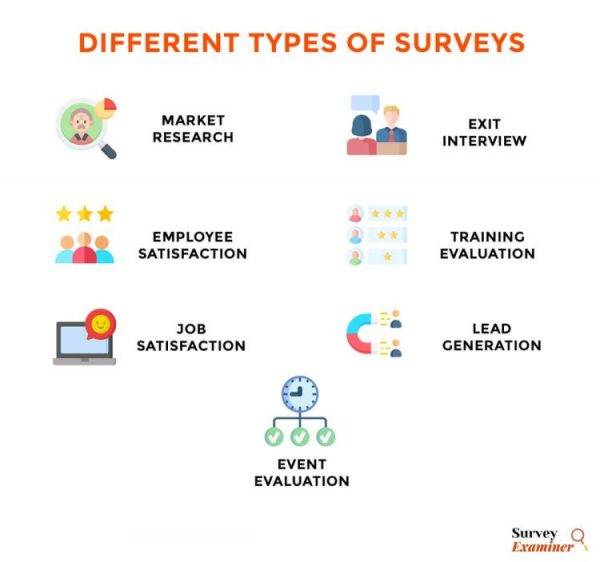
Surveys are not only an ideal means of making extra cash but also crucial tools in a company’s growth. Different surveys are used to collect information from the public and customers.
Surveys are instruments used to collect information about a particular subject. People looking for side hustles participate in surveys as a great source of additional income.
But on the flip side, we have groups that rely on different types of surveys to gather insights into certain pertinent matters affecting their business.
For example, marketers rely on surveys to find information on customer satisfaction, employers use surveys to collect employee data, and the list goes on and on.
Whether it’s an audit survey, market research surveys, job satisfaction surveys, or customer feedback surveys, businesses use these surveys to determine their path.

Before we dig deeper into some of the different types of surveys that can help grow your business, let’s explore the two different types of survey instruments.

For all the different types of surveys, there are two methods or techniques that businesses can use. They include:
This is a conventional survey approach that involves giving respondents a list of questions they can answer individually. Most of these survey questions are closed-ended but may also be open-ended questions.
The three most-applied methods that use questionnaires include:
Most researchers use the self-administered approach.
This technique involves more probing and is more personal. The researcher asks follow-up questions to gain deeper insights into a matter. This approach has one major setback, which is it’s quite time-consuming.
The three most-applied approaches for personal interviews include:
The three most applied methods for the personal interview are the phone interview and the face-to-face. So, without further ado, here is the list of types of surveys that could help you improve your business.
| Survey Type | Description | Pros | Cons |
|---|---|---|---|
| Online Surveys | Surveys conducted via the internet | Cost-effective, quick, wide reach | Limited control, potential for bias |
| Phone Surveys | Surveys conducted via telephone | Personal interaction, clarification possible | Time-consuming, expensive, lower response rates |
| Mail Surveys | Surveys sent and returned via mail | Reaches people without internet, less intrusive | Slow response times, expensive, low response rates |
| In-Person Surveys | Surveys conducted face-to-face | Personal interaction, high response rates | Time-consuming, expensive, interviewer bias |
| Panel Surveys | Surveys using a pre-recruited group of respondents | Quick, targeted, longitudinal data possible | Panel fatigue, potential for bias |
| Kiosk Surveys | Surveys conducted via on-site kiosks | Immediate feedback, high response rates | Limited to specific locations, expensive setup |
This is one of the conventional research surveys used by business owners, marketers, and executives to discover insights into their customers’ behaviors. It is one of the most common types of surveys and some of these surveys are paid phone surveys.
Market research surveys offer insights into how, where, and who purchases your products, your competitive position in the industry, and even your customers’ needs. Its fundamental purpose is to understand the company, customer, and competition.
Market research is categorized into two. It can either be primary market research or secondary market research. Primary market research helps collect new data that has not been gathered before, and secondary market research involves collecting information that has already been produced.
There are several types of surveys in this section. They include:
Most market research companies recruit members globally to fill out surveys for money. They rely on people’s opinions and offer rewards and cash in return for their opinions.
People join these online survey sites to get paid to take surveys. Be sure the site you join is legit, as there are many scammers out there.
Some of the most reliable types of surveys that people join, to enjoy surveys for free food, to get paid, to enjoy to answer questions include:
Market research data helps to:

Here are the six steps to follow when creating a market research survey:
The employee satisfaction survey approach helps measure whether your employees are content with their work situation. During the survey, employees voice their concerns and frustrations about the nature of their work and the company.
This type of survey helps get feedback about employees’ feelings about their workplace. Positive results show employees are satisfied with their nature of work, team, or company. Negative results show there is room for improvement.
Some common employee satisfaction survey questions include:
This type of survey should preserve the respondents’ anonymity to increase their honesty threshold. The survey should occur less often, for example, annually.
Employee satisfaction survey helps the employer:
Get deeper insights into how the employees feel about their work and where to improve. Employees also feel included in making company changes, which will help boost their morale.
See Related: Best Online Jobs for 14-Year-Olds
The job satisfaction survey differs greatly from an employee satisfaction survey but has several similarities. A job satisfaction survey helps gauge overall job satisfaction.
While all employees take an employee satisfaction survey, a job satisfaction survey asks for a particular employee’s personal views to understand their satisfaction with their tasks.
Companies that measure job satisfaction outperform those that don’t. This is why- Job satisfaction measures help boost employees’ morale. Some of the job satisfaction survey questions include:
When carrying out this survey, emphasize the confidentiality aspect. The survey helps point out what keeps the employee happy and what needs improvement.
A job satisfaction survey helps:
See Related: Best Data Entry Jobs
Several reasons can make an employee quit or leave their once-loved job, such as personal conflicts with management or employees, financial or extra benefits, lack of opportunity advancement to another job, or unrelated work environment reasons. An exit interview survey helps understand why employees leave the company.
Employers can ask exit interview survey questions like:
This type of survey can help employers:
See Related: Is QuickToughts Legit?
If you want to remain on top of the latest trends and stimulate growth in your employees and company, carrying out training is vital. A training evaluation survey helps offer pieces of training.
The techniques help your employees voice their opinion regarding the relevance of training and the quality of training.
The survey helps determine if critical subjects were well understood and tackle any rising issues as soon as they arise. The instructor can actually use some of the suggestions given instantly and even address certain specific points in class.
A training evaluation survey should have questions such as:
The survey helps employers:
See Related: Tips for College Students Taking Surveys

This type of survey helps companies gather the target audience’s contact information and preferences. With the data collected, you can list potential customers who may be genuinely interested in your services or products.
An example of lead generation survey questions is:
Creating playful and interactive puzzles and quizzes can help increase engagement here. Also, providing or promising to offer the respondents something they value increases participation.
A good lead generation survey will get you:
Be cautious when giving out personal information. Ensure the company is legitimate and that your information is likely confidential.
See related: InboxDollars vs Swagbucks: What Site is Better?
When a company or an organization organizes an event, they often need to know if it was a success. Having a hunch or thinking that it was successful is not enough to determine it.
There is a need to do an event evaluation survey after the event to determine what attendees thought about it. The results can help tell if the event met its objectives and, if not, what to improve on.
An event evaluation survey should be short and to the point while still allowing the respondents to provide their opinions about every aspect of the event.
Use event evaluation survey questions such as:
An event evaluation survey helps.
If you keep the survey short and straightforward, you’ll receive more honest opinions, which will help you prepare for the next event.
Related Reviews
Related Resources
Last updated: April 2, 2024